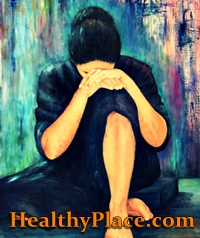Mourning the Loss of a Negative Coping Skill
In group therapy today we talked about grieving. What surprised me was that giving up an addiction was considered a loss one might grieve. It makes sense when you think about it--many times addictions are a coping skill, albeit a negative one, for people with borderline personality disorder (BPD).
So how should we cope with the loss of a negative coping skill? We should build, maintain and rely on a support system; we should understand and accept that we are grieving a loss; and we should concentrate on taking care of ourselves.
Build, maintain and rely on a support system
There are many self-help groups for people with addiction, with Alcoholics Anonymous and Narcotics Anonymous being perhaps the best known. When you are battling an addiction, it is vital to find supportive people who will listen to you and spend time with you. It is crucial to have someone who understands the pain that leads to addiction, whether it be drinking, using drugs, or self-injury.
Isolating yourself is a risk factor for relapse; according to the acronym HALT we are more likely to use when hungry, angry, lonely or tired.
It may be difficult to reach out to others, but it is helpful to walk the road to recovery with someone who understands the loss you're dealing with.
Understand and accept that we are grieving a loss
 Grief tends to come in five stages: denial, anger, bargaining, depression, and acceptance. This is especially true when it comes to addiction. We first deny that we feel a sense of loss, usually out of fear of not doing recovery right. We become angry that we can no longer use our drug or action of choice. We try to bargain with God or whatever Higher Power we believe there is to let us keep our addiction under control. We become depressed when we realize we have to give it up. Finally, we accept that we are alcoholics/addicts and adjust our actions accordingly.
Grief tends to come in five stages: denial, anger, bargaining, depression, and acceptance. This is especially true when it comes to addiction. We first deny that we feel a sense of loss, usually out of fear of not doing recovery right. We become angry that we can no longer use our drug or action of choice. We try to bargain with God or whatever Higher Power we believe there is to let us keep our addiction under control. We become depressed when we realize we have to give it up. Finally, we accept that we are alcoholics/addicts and adjust our actions accordingly.
Feeling like you are falling apart or going crazy is normal. After all, a big part of our identity was wrapped up in the addictive lifestyle. It was our primary coping skill, and now we have to learn to live without it. Mourning the loss of an addiction does not mean you are doing recovery wrong. It does not mean relapse is inevitable. It is not a sign you are not adequately handling the situation
Concentrate on taking care of yourself
According to the acronym HALT, we are more likely to relapse when we are hungry, angry, lonely or tired. Focusing on self-care can help minimize or avoid these feelings. It is important not to neglect ourselves.
We need to eat right, get enough rest, and exercise regularly. If we fail to do these things, we are more vulnerable to depression and stress even under normal circumstances. The risk of these feelings intensifies during times of mourning, even if it's a negative coping skill that we've lost.
At the same time, we need to realize we might be a little off when we're in the early stages of recovery. We simply don't function as well during early recovery. We are less effective at work, more prone to relationship problems, more likely to become physically ill, and more accident-prone. Ask anyone who has quit smoking about what the first few days were like. We need to anticipate this and remind ourselves not to push ourselves too hard.
We also need to meet our spiritual needs. Faith enables people to move mountains, which is exactly what recovering from an addiction feels like. Belief in and reliance on something greater than oneself is empowering. Spirituality is also a vital part of the Twelve Steps.
Yes, addiction is a negative coping skill, and it has a grieving period. But you can survive without it, even if you mourn it in the short term.
APA Reference
Oberg, B.
(2012, March 27). Mourning the Loss of a Negative Coping Skill, HealthyPlace. Retrieved
on 2026, March 3 from https://www.healthyplace.com/blogs/borderline/2012/03/mourning-the-loss-of-a-negative-coping-skill